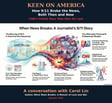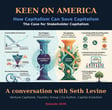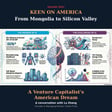
Episode 2542: John Cassidy on Capitalism and its Critics
Yesterday, the self-styled San Francisco “progressive” Joan Williams was on the show arguing that Democrats need to relearn the language of the American working class. But, as some of you have noted, Williams seems oblivious to the fact that politics is about more than simply aping other people’s language. What you say matters, and the language of American working class, like all industrial working classes, is rooted in a critique of capitalism. She should probably read the New Yorker staff writer John Cassidy’s excellent new book, Capitalism and its Critics, which traces capitalism's evolution and criticism from the East India Company through modern times. He defines capitalism as production for profit by privately-owned companies in markets, encompassing various forms from Chinese state capitalism to hyper-globalization. The book examines capitalism’s most articulate critics including the Luddites, Marx, Engels, Thomas Carlisle, Adam Smith, Rosa Luxemburg, Keynes & Hayek, and contemporary figures like Sylvia Federici and Thomas Piketty. Cassidy explores how major economists were often critics of their era's dominant capitalist model, and untangles capitalism's complicated relationship with colonialism, slavery and AI which he regards as a potentially unprecedented economic disruption. This should be essential listening for all Democrats seeking to reinvent a post Biden-Harris party and message.
5 key takeaways
* Capitalism has many forms - From Chinese state capitalism to Keynesian managed capitalism to hyper-globalization, all fitting the basic definition of production for profit by privately-owned companies in markets.
* Great economists are typically critics - Smith criticized mercantile capitalism, Keynes critiqued laissez-faire capitalism, and Hayek/Friedman opposed managed capitalism. Each generation's leading economists challenge their era's dominant model.
* Modern corporate structure has deep roots - The East India Company was essentially a modern multinational corporation with headquarters, board of directors, stockholders, and even a private army - showing capitalism's organizational continuity across centuries.
* Capitalism is intertwined with colonialism and slavery - Industrial capitalism was built on pre-existing colonial and slave systems, particularly through the cotton industry and plantation economies.
* AI represents a potentially unprecedented disruption - Unlike previous technological waves, AI may substitute rather than complement human labor on a massive scale, potentially creating political backlash exceeding even the "China shock" that contributed to Trump's rise.
Keen On America is a reader-supported publication. To receive new posts and support my work, consider becoming a free or paid subscriber.
Full Transcript
Andrew Keen: Hello, everybody. A couple of days ago, we did a show with Joan Williams. She has a new book out, "Outclassed: How the Left Lost the Working Class and How to Win Them Back." A book about language, about how to talk to the American working class. She also had a piece in Jacobin Magazine, an anti-capitalist magazine, about how the left needs to speak to what she calls average American values. We talked, of course, about Bernie Sanders and AOC and their language of fighting oligarchy, and the New York Times followed that up with "The Enduring Power of Anti-Capitalism in American Politics."
But of course, that brings the question: what exactly is capitalism? I did a little bit of research. We c


















